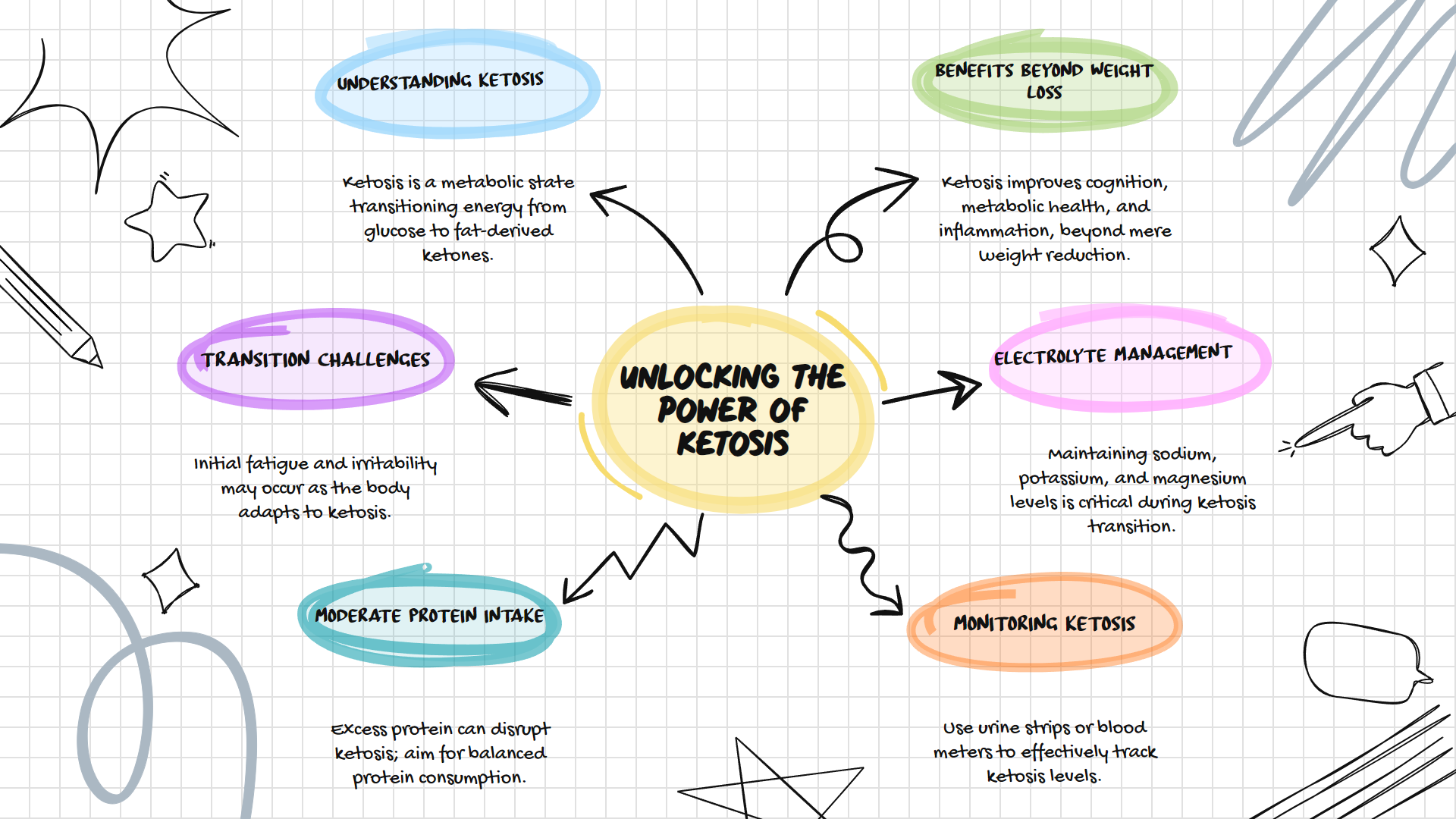
Unlocking Your Body's Metabolic Superpower Through Ketosis
Unlocking Your Body's Metabolic Superpower Through Ketosis
Your body waits. A metabolic marvel, poised to transform. When carbohydrates vanish from your plate, something remarkable happens.
Ketosis represents far more than another dietary buzzword. This natural metabolic state fundamentally changes how your body produces energy, shifting from glucose dependency to fat utilization. While mainstream nutrition has long championed carbohydrates as our primary fuel source, mounting evidence suggests our bodies may operate optimally when occasionally liberated from glucose dominance.
The Metabolic Switch
Understanding ketosis requires a brief journey through human metabolism. When carbohydrate intake drops below approximately 50 grams daily, your body depletes its glycogen stores within 24-48 hours. Facing this carbohydrate shortage, your liver begins converting fatty acids into ketone bodies. These molecules become the alternative fuel source for your brain, heart, and muscles.
Three primary ketone bodies emerge during this process: beta-hydroxybutyrate (BHB), acetoacetate, and acetone. BHB represents the most abundant and metabolically significant ketone, crossing the blood-brain barrier to nourish neurons that traditionally relied on glucose.
This metabolic flexibility reflects our evolutionary heritage. Our ancestors likely cycled through periods of feast and famine, developing the capacity to thrive during extended periods without carbohydrates. Modern research suggests this ancient adaptation might hold solutions for contemporary health challenges.
Beyond Weight Loss
While ketosis gained popularity primarily as a weight loss strategy, research reveals a broader spectrum of potential benefits. The metabolic state influences multiple physiological systems:
Cognitive function often improves during ketosis. Many practitioners report enhanced mental clarity, focus, and reduced brain fog. Research indicates ketones provide more efficient energy for brain cells than glucose while reducing oxidative stress and inflammation.
Metabolic health markers frequently improve during ketosis. Studies show reductions in triglycerides, improvements in HDL cholesterol profiles, and better insulin sensitivity. For individuals with insulin resistance or type 2 diabetes, ketosis can help stabilize blood sugar levels and potentially reduce medication requirements.
Inflammation reduction represents another significant benefit. Ketone bodies, particularly BHB, inhibit inflammatory pathways and reduce oxidative stress throughout the body. This anti-inflammatory effect may contribute to improvements in various chronic conditions.
Mitochondrial health and biogenesis increase during ketosis. Your cells produce more energy-generating mitochondria, potentially enhancing overall cellular function and longevity.
Practical Implementation
Transitioning into ketosis requires intentional dietary modification. Most individuals need to limit carbohydrate consumption to 20-50 grams daily while increasing healthy fat intake and maintaining moderate protein consumption.
The initial transition often presents challenges. As your body adapts to using ketones instead of glucose, you might experience the "keto flu" with symptoms including fatigue, headaches, irritability, and brain fog. These symptoms typically subside within days to weeks as metabolic adaptation occurs.
Proper electrolyte management proves crucial during this transition. Sodium, potassium, and magnesium levels require careful attention as insulin levels drop, causing increased mineral excretion through urine. Supplementation often becomes necessary to maintain optimal electrolyte balance.
Protein intake requires thoughtful moderation. Excessive protein consumption can trigger gluconeogenesis, where protein converts to glucose, potentially disrupting ketosis. Most practitioners find success with moderate protein intake of 0.6-1.0 grams per pound of lean body mass.
Monitoring ketosis helps ensure successful implementation. Methods range from urine strips (measuring acetoacetate) to blood meters (measuring BHB) to breath analyzers (measuring acetone). Blood testing provides the most accurate assessment but requires finger pricks and testing strips.
Navigating Common Challenges
Social situations present frequent obstacles for ketosis adherence. Restaurant meals, family gatherings, and workplace events often center around carbohydrate-rich foods. Developing strategies for these situations proves essential for long-term success.
Athletic performance initially decreases for many individuals during ketosis adaptation. However, research indicates that after full adaptation (typically 4-12 weeks), performance often returns to baseline or improves, particularly for endurance activities.
Sustainability concerns arise with any dietary approach. While some individuals maintain continuous ketosis for years, others benefit from a cyclical approach, incorporating periods of higher carbohydrate intake. Personalization based on individual goals, health status, and lifestyle factors determines the optimal approach.
The Future of Metabolic Health
Ketosis research continues expanding beyond weight management into therapeutic applications for neurological conditions, cancer adjunctive care, and longevity. The metabolic state's influence on cellular signaling pathways suggests potential applications we've only begun to understand.
The growing recognition of metabolic flexibility as a health marker may ultimately position ketosis not as an all-or-nothing approach but as one tool within a broader metabolic health framework. The ability to seamlessly transition between glucose and ketone metabolism likely represents optimal human functioning.
Your body contains ancient wisdom. The metabolic machinery that allowed human survival through millennia of unpredictable food availability remains encoded in your cells. Ketosis offers one pathway to reconnect with this metabolic heritage, potentially unlocking health benefits our carbohydrate-centric food environment rarely allows us to experience.
As research advances and clinical applications expand, ketosis continues emerging as a powerful intervention for metabolic health optimization. Whether pursued for weight management, cognitive enhancement, or disease prevention, understanding the mechanisms, benefits, and implementation strategies empowers informed decisions about this fascinating metabolic state.
